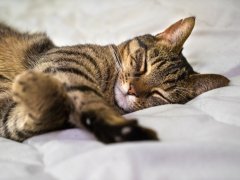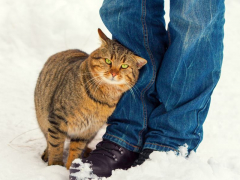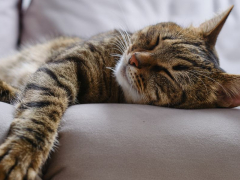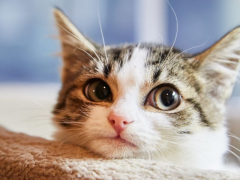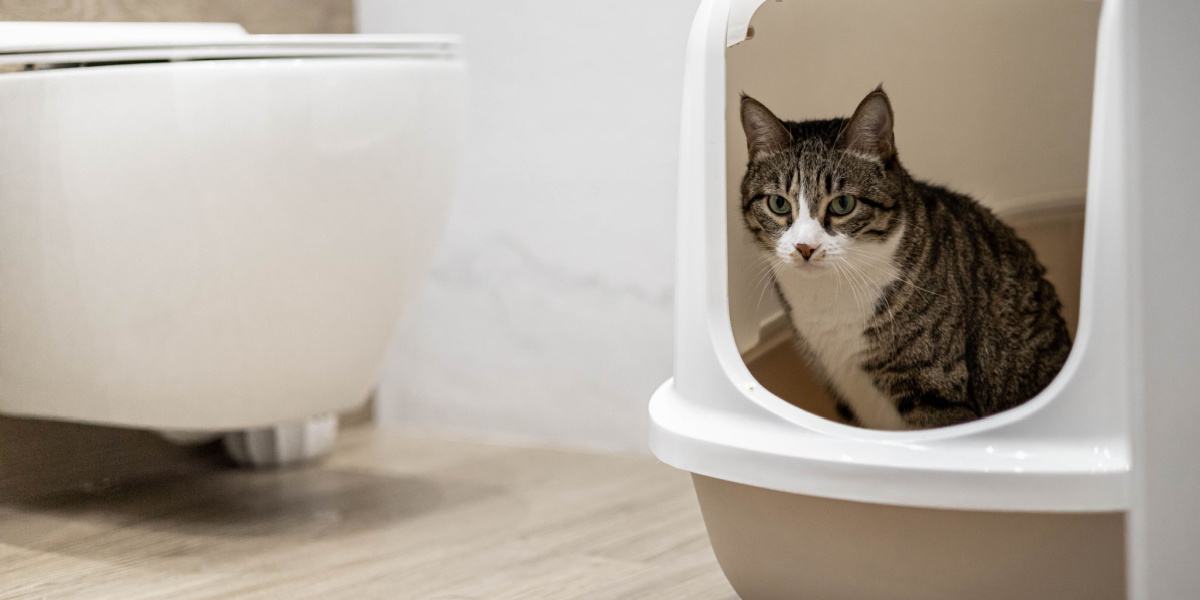
The pungent smell of cat pee is the last thing anyone wants lingering around their home. Fortunately, cats are usually easy to train to use a litter box, and most are fastidious in their toilet habits. Unfortunately, sometimes there are exceptions, and toileting issues are one of the main reasons cats are relinquished to animal shelters.
Once a cat has urinated in a location, they generally return to the same place to pee if the smell lingers. Although certain scents such as vinegar and peppermint are unpleasant for cats and might deter them from peeing in a certain spot, it is unlikely to resolve the problem unless the underlying reason for the behavior is addressed. After having your cat checked by a veterinarian for a medical cause for peeing outside the litter box, identify the underlying reason for the cat's behavior so it can be addressed.Key Takeaways
In this article, we will discuss using scents that cats find unpleasant to try and stop this antisocial habit, but also why this approach might be doomed to failure.
Cats Are Super Sniffers!
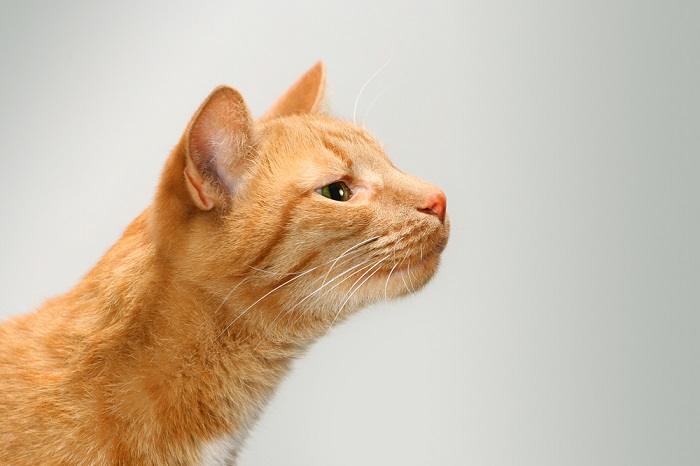
Cats’ sense of smell is so sensitive that they can smell things humans can’t.
Sense of smell is very important to our feline companions, they have more than 200 million scent receptors in their noses (40 times more than us humans). They have a dual scent mechanism: regular scent receptors in their noses and also a vomeronasal organ in the roof of their mouths that picks up pheromones.
Our domestic kitties share this incredible sense of smell with their wild ancestors and use it in all areas of their lives, including detecting and communicating with other cats, finding prey and food, and avoiding toxins.
Cat urine is typically very concentrated and strong smelling. It contains pheromones and is therefore an important way in which cats communicate with each other regarding territory boundaries. Male cat pee is especially smelly due to high levels of hormones and pheromones, which send messages to female cats that they are a potential mate and tell other male cats to stay away!
What Takes Cat Pee Smell Away?
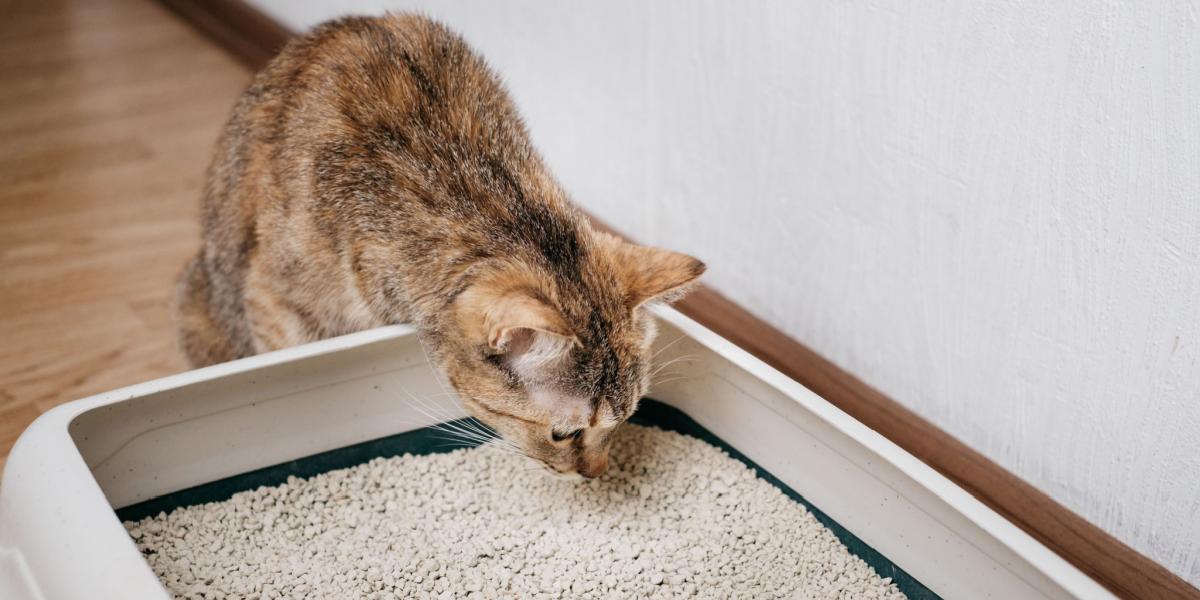
The lingering smell of pee, even if it’s very faint, can cause a cat to return to the area and pee there again.
Once a cat has urinated in a location they will often return to the same place to pee if the smell lingers, and it can become their regular toilet. Remember that cats have a much better sense of smell than us, so it is really important if they urinate in an undesirable place to clean the area well to try and avoid lingering odors.
Avoid ammonia-containing products—these smell like urine to cats and will make them even more likely to use the area again. Ideally, use enzyme-based cleaners designed for pet accidents that will safely neutralize smells and clean stains.
Other options are baking soda (which absorbs the urine and removes the odor) and vinegar which is nontoxic, a good cleaner, and has an unpleasant smell to cats, so they may be less likely to return to the spot and pee again. More information can be found in our articles on how to get rid of cat pee smell, and top cat urine removers.
What Smells Deter Cats From Peeing?
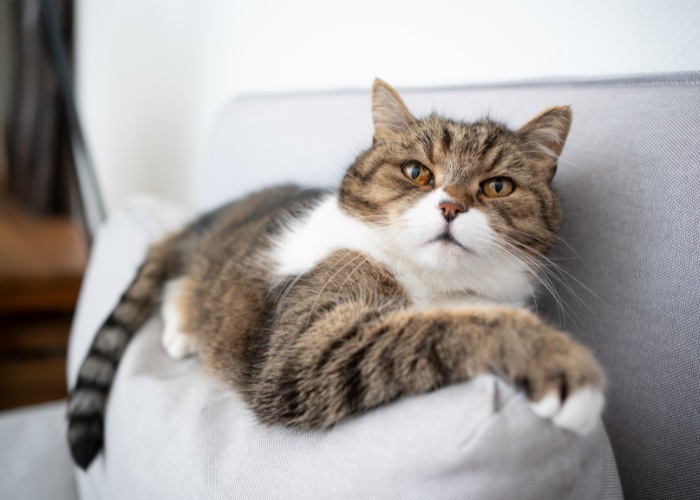
There are certain odors that almost all cats dislike, including citrus, mustard, vinegar, and pepperment.
Once the area has been cleaned, some people suggest using scents to deter cats from peeing there again. There are several odors that cats consistently seem to dislike—it is thought that this might be a protective mechanism as some of the substances are toxic to our feline companions. Some examples of smells cats hate are:
- Citrus
- Bananas
- Mustard
- Vinegar
- Pine
- Cedar
- Peppermint
- Coffee
- Lavender
If you want to use a scent to try to deter a cat from peeing, it’s important to pick a substance that’s nontoxic to cats and is part of a pet-safe formulation. It’s important to note that many essential oils can be harmful to cats if they are ingested, inhaled, or come into direct contact with their skin or fur, potentially causing organ damage, liver failure, seizures, and even death. Likewise, coffee, including coffee grinds, is toxic to cats if ingested.
Also Read: Are Humidifiers Good For Cats?
Why Using Smells Cats Hate Won’t Stop Cats Peeing
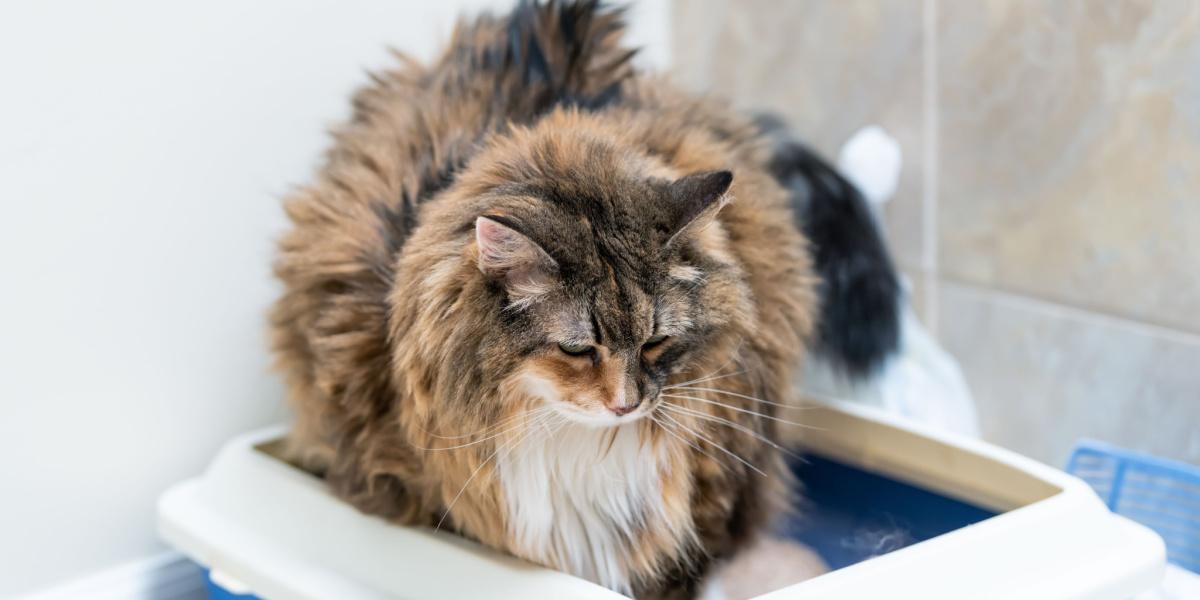
Trying to deter cats from peeing outside the box just by using scents they find offensive isn’t likely to resolve the issue.
Unfortunately, if the underlying reason for the cat’s behavior is not addressed, they will likely just avoid the area where the scent has been applied, and pee somewhere else just as unsuitable instead!
Cats are usually fastidious about their toileting habits, so finding urine stains and smells in unusual places is a sign something is amiss in the cat’s world. It is important to note that your feline family member is not doing this out of spite, so avoid punishing them—that is likely to exacerbate the problem.
Given their strong sense of smell, when cats encounter unpleasant odors, it can cause them great anxiety, which can lead to further problem behaviors and might actually make the problem worse.
So rather than just scattering lemon and orange peel around the house, we must look deeper to get to the root of the problem.
Also Read: Why Do Cats Pee On Bathroom Rugs?
What Is Cat House Soiling?
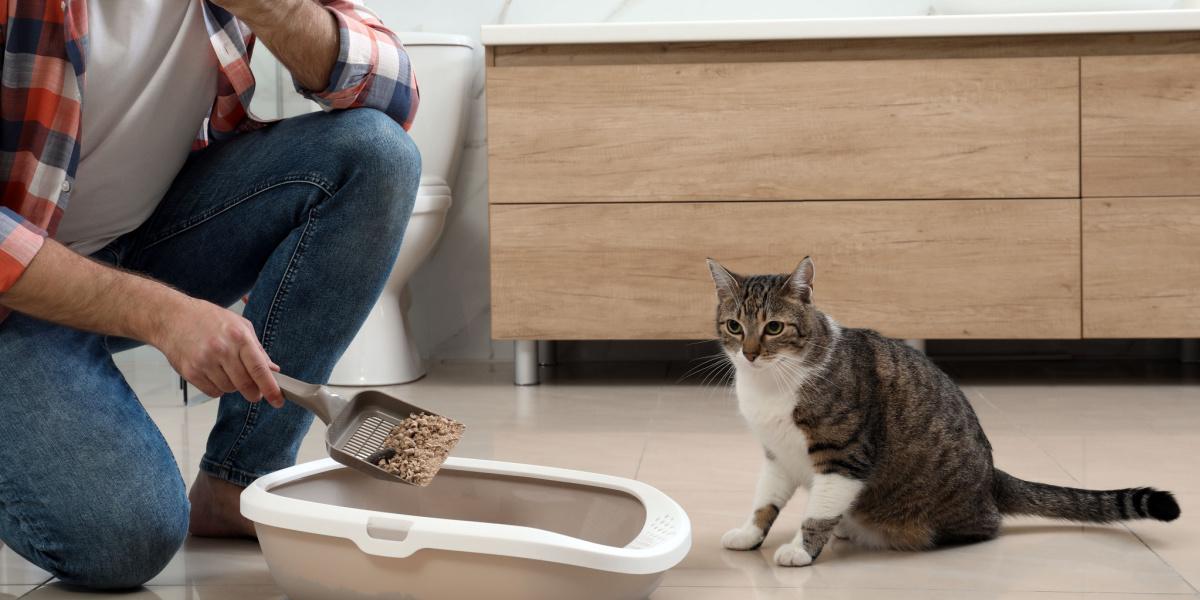
Spraying is urine is different than simply peeing, so it might need different steps to stop the behavior.
Feline house soiling is the recommended term by a panel of cat experts from the American Association of Feline Practitioners (AAFP) and the International Society of Feline Medicine (ISFM) to describe the “deposition of urine or feces on objects or on vertical or horizontal surfaces in locations unacceptable to the owner.”
You may also hear people referring to this as inappropriate urination—where cats stop using the litter box and pee elsewhere in the house. The cat squats to deposit urine on horizontal surfaces like duvets, carpets, baths, sinks, sofa cushions, and laundry.
On the other hand, cats that are spraying are marking their territory. The cat is usually standing with their tail raised and quivering, treading their back feet while spraying a small amount of urine backwards onto vertical surfaces such as walls, curtains, shopping bags, and shoes.
This is a completely normal behavior for cats as it’s a key way to leave their scent signals for other cats. The more cats in the household, the more likely they will spray urine. It is most common in un-neutered cats as part of their sexual behavior, but 10% of neutered males and 5% of neutered females still spray urine. Stopping spraying is different to stopping cats peeing, so it’s important to figure out which your cat is doing.
Also Read: Why Do Cats Wag Their Tails?
Causes Of Cat House Soiling
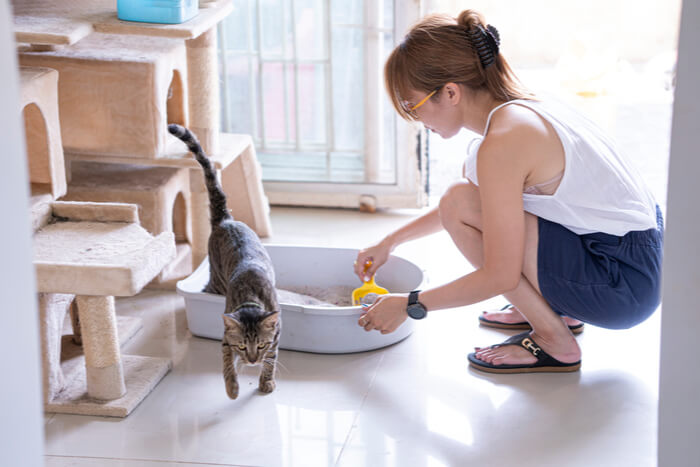
Before assuming the peeing is behavioral, bring your cat in to the veterinarian to look for medical causes.
To have any chance of solving the issue long-term, you must uncover the reason for this unpleasant behavior. Make an appointment with your cat’s veterinarian to give them a thorough health check to look for any medical issues that might cause inappropriate urination such as bladder stones, kidney disease, urinary tract infections, feline idiopathic cystitis (FIC), and diabetes.
They will also look for conditions such as arthritis in older cats, which might make it hard for them to get into the litter box. Your veterinarian might recommend blood and urine tests, or other investigations such as radiographs and ultrasound scans.
Once medical causes, FIC, and marking behavior have been ruled out, it’s likely that environmental and social factors are the cause of your cat’s peeing. Issues with litter boxes are very important to identify, so consider the following:
- Use large, clean boxes in private (yet easily accessible) locations
- Have one more litter box than the total number of cats in the household (for example, two cats should have three litter boxes)
- Cats tend to prefer fine, sand-like, unscented, clumping litter
- Scoop the box out daily, and completely empty and clean once a week
- Avoid doing anything unpleasant while the cat is in their box (e.g., administering medications)
- Position the litter box away from the cat’s food and water
- Watch to ensure that dominant cats are not blocking access to the litter boxes for more nervous cats
Also Read: How Do Cats Know To Use A Litter Box?
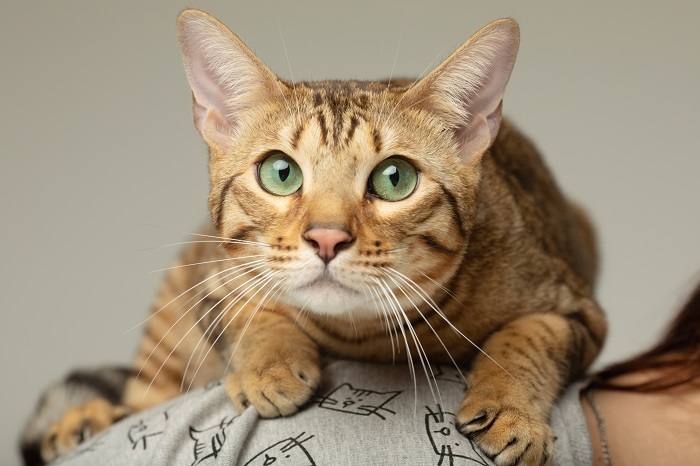
Not using their litter box is a cry for help from your cat.
What Can I Do To Stop Cats Peeing Everywhere?
House soiling is unpleasant for owners, but also a serious cry for help from your cat. Although using unpleasant scents as deterrent might help in the short term, it’s important to tackle the root cause rather than just hide the problem, or you’ll soon find it recurs. The following suggestions may help:
- Neuter your cats—90% of male cats and 95% of females show a decrease in urine spraying after neutering
- Speak to your veterinarian to ensure there are no medical causes which require treatment, and to get their help, advice, and support
- Use pheromones such as Feliway, which have been shown to reduce urine spraying by up to 90%
- Thoroughly clean soiled areas and restrict the cat’s access to them if possible (e.g., using aluminum foil or plastic sheets)
- Move food and water bowls to the soiled area as cats are less likely to toilet next to these
- Put toys and/or catnip in the affected area to help create positive associations
- Optimize litter box management
- Help your cat feel more secure in their territory (e.g., use a microchip cat flap to avoid other cats entering the house, and cover windows so that indoor cats can not see other cats outside
- Temporarily pin curtains up out of the way if they are a target for peeing
- In multi-cat households, ensure there is one extra set of resources (litter box, food, water, bed, hiding place) than the total number of cats to reduce stress and anxiety
- Consider referral to a pet behaviorist
Also Read: Why Is My Cat So Annoying? Cat Attention-Seeking Behavior Explained
In Summary
Although certain scents such as vinegar and peppermint are unpleasant for cats and might deter them from peeing in a certain spot, unless the underlying reason for the behavior is addressed the cat will probably just use a different location in the house.
It is vital to talk to your veterinarian as soon as possible to ensure your cat is not suffering from a medical condition, as well as reviewing and optimizing litter box management in the home.
Also Read: The 5 Best Cat Scratch Deterrents
Frequently Asked Questions
What smell do cats hate?
Most cats seem to dislike several scents, including citrus fruits, peppermint, coffee, lavender, and vinegar. Cats have a very strong sense of smell compared to people, so it may be that they find these smells overpowering, but it is also thought it might be protective to them as some of these (such as coffee and essential oils) can also be toxic.
Is vinegar a good cat repellent?
Vinegar is useful for deterring cats as they don't like the smell and it is harmless to them. It also has good cleaning properties, so it can be used to clean areas we want our cats to stay away from.
How do I stop my cat peeing everywhere?
If your cat has not been neutered, then schedule this with your veterinarian ASAP as most cats will stop urine spraying after they are neutered. Unfortunately, in many cases the answer is not so easy, but with help from your veterinarian you should be able to get to the root of the problem and hopefully resolve it.
Tests may reveal your cat is suffering from a medical condition that requires treatment, or there may be a behavioral cause such as stress or anxiety, in which case pheromones may help. Litter box issues are a common cause of house soiling, so it is very important to ensure that cats' litter boxes are of a suitable size, well positioned, clean, and don't contain strongly scented litter.
Most important, remember that your cat is not peeing everywhere out of spite or naughtiness, and never punish them for it as it will not help, and stress and anxiety can make the problem worse.
-
Carney HC, Sadek TP, Curtis T, et al. AAFP and ISFM guidelines for diagnosing and solving house-soiling behavior in cats. J Feline Med Surg 2014; 16(7):579-598
-
catvets.com/gudelines/practice-guidelines/house-soiling
-
icatcare.org
-
www.cats.org.uk


